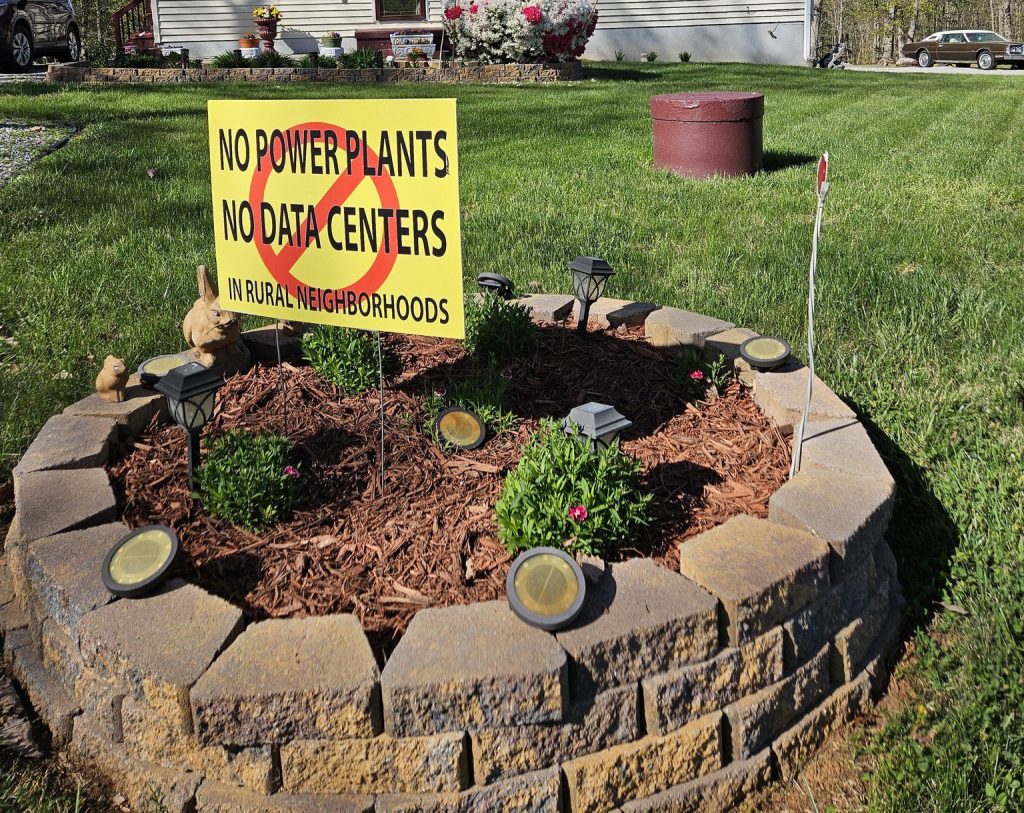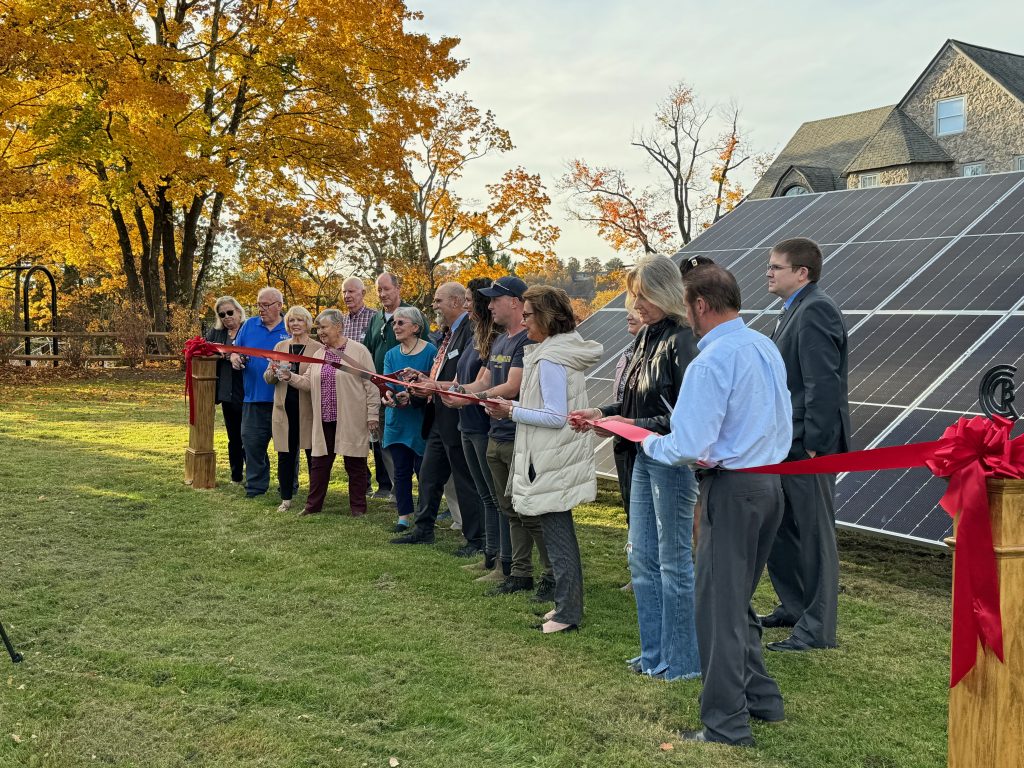Two Catholic Sisters: Working in the Web of Life
For the past 26 years, Sister Beth Davies has lived in one of the most remote towns of southwestern Virginia, in a little coal camp called St. Charles. Her “holler” literally dead ends into a mountain, but it is neither a metaphor for the way she lives or what she has helped the people of central Appalachia accomplish in the fight against the devastation caused by strip mining and private landfills. When she decided to live there, a member of the community asked her what she would do. “I don’t know,” she replied. “The people will have to tell me.”
And the people did.
One of her most poignant memories is that of a retired miner who invited her to his porch to talk about strip mining. “He said, ‘They came in and took our trees. They came in and took our coal.’” Sister Beth recalls tears rolling down his weathered face as he added, “’I thought they would never take our mountains, and now they’re even taking our mountains.’”
Sister Beth (Congregation of Notre Dame) and the late Sister Elizabeth Vines (Congregation of Divine Providence), who moved to St. Charles in 1982, have helped to organize the residents of southwest Virginia around many issues which all have a common denominator: whether it is coal sludge, garbage, or using human beings as commodity, the Sisters will not allow central Appalachia to be America’s dumping ground.
Sister Beth works in an old municipal building, an artifact from the War on Poverty that sits near the railroad tracks in Pennington Gap. In the late 1960’s, her first “immersion” into central Appalachia followed a project in a Connecticut high school where she was a principal. She felt that the students there, who came from wealthy families, would benefit from a “Christian Humanism” seminar, where they would learn about poverty, social change, and social justice and then live and work in an impoverished area to be fully immersed in the topic.
She says the students’ reaction to Appalachia was that it was a “very rich area with very poor people.” They saw the paradox and began to ask questions as a result, says Davies. They said, “These people are living on the richest land in the world, so why don’t they have the best roads, the best health care, the best schools?”
Sister Elizabeth saw the same paradox between iron ore country in Duluth, Minnesota, where she had been raised and central Appalachia’s coalfields. She was perplexed as to why the coalfields were so different from the Midwest, where iron ore profits made the community a better place to live. Sister Beth remembers her saying, “‘Everything’s going out, and nothing is coming in.’”
Following a summer in Central Appalachia, Sister Beth decided to move there for good in 1972, against the advice of some who called her crazy. However, coming from a blend of Scottish and Irish heritage, she says the mountains had been her favorite place to go since childhood. “I felt at home in the mountains.”
In those first few years, Sister Beth helped to build a community center in St. Charles, where people could “meet, come to know each other, and share their experiences.” At that time, she was a member of the Citizens for Better Reclamation, a group who “had a great deal to do with the Federal Strip Mining Law, which came into existence in 1979.” People had been organizing around the issue, but during the flood of 1977, which devastated the southwest Virginia region, Sister Beth says the reality of what strip mining had done to the land literally hit home. “We were living in it. No one could get in and we couldn’t get out. All of a sudden the impact was so terrible.”
A miner who had resisted the group’s work sought out Sister Beth. “I was really opposed to the group and what it was doing because that job helped put food on my table,” he told her. “Now that I see it’s washing the table from under us, we’re joining your group.”
In the 1980’s the Sisters led the fight against the first of two proposals for private landfills in Lee County. Sister Beth says that they were made aware of the secret proposed landfill from someone in Wise County, where they were fighting their own landfill battle. At the next Board of Supervisors’ meeting in Lee County, she asked the Board if the rumor was true and where the landfill would be located.
“’It’s already in process,’” they said, “’and we can’t do anything about it.’” I said, “Maybe you can’t, but we can.” And then I sat down and said to Elizabeth, “Who’s we?” Sister Beth laughs at the memory but adds that it was a long, hard battle to win.
“People were incensed, so it was easy to organize around that issue.” she says, “It crossed all lines because of the threat to groundwater.”
Another battle followed against a proposed coal ash landfill in Keokee, Virginia, and with the Penn Virginia Corporation. During this time, Sister Beth helped to create Citizens for Lee Environmental Action Network (CLEAN.) To present their list of incentives to the county, Penn Virginia hosted a dinner at a local hotel. They invited influential members of the community, including Sister Beth.
A caravan of protesters came from Lee County, along with the television reporters they had invited. While they picketed outside the hotel, Sister Beth was the only member of the audience inside who was asking questions.
“They were presenting this as if it was the best thing to happen to Lee County, but we had done our research,” Sister Beth says. “The company was from upstate NY and we got in touch with some of the citizens there who sent me newspaper articles about the ‘state of the art’ landfill, which had a multimillion dollar lawsuit against it.” While company executives were debating her, point for point, protestors outside were handing their research to the press.
For the Sisters and those who were organizing around these issues, it became a war of incentives versus research, and short-term gains versus long-term consequences. “Everything’s always ‘state of the art’ and wonderful,” Sister Beth says of landfill proposals. But by networking, researching, and educating the very people who would be most affected by the outcomes, central Appalachia won again.
In 1996, a leaking coal slurry owned by Lone Mountain Coal Company led to a devastating spill of coal waste in southwest Virginia, stretching for nine miles downstream, killing thousands of fish and threatening a rare population of mussels that are found only in that region. According to news reports, earlier coal spills had nearly wiped out similar mussel species, which are biological indicators of fresh water.
The EPA and U.S. Fish and Wildlife Service brought a lawsuit against Arch Mineral, a victory for grassroots organizations like the Coalition for Jobs and the Environment, which had been founded in 1990 to bring together eastern Tennessee and southwestern Virginia groups like CLEAN, who were under the same watershed.
The resulting verdict led to $1.51 million in restitution, which helped to get water to the citizens of St. Charles, who had depended on mountain streams and wells. Until then, Sister Beth says, St. Charles had been unable to secure grant money for water because they did not have a funding base.
Her latest environmental victory is the multimillion dollar cleanup of an acid bog in the Ely Creek community near St. Charles. “We brought groups here and they saw a wasteland that used to be a beautiful place.” The coal waste had seeped off the mountain and eroded everything in its path, leaving a swamp of acid drainage.
Sister Beth worked with Virginia Tech and the Nature Conservancy to spread the word about restoration. The Army Corps of Engineers has also stepped in to fund the project, which she says is high on their list of priorities because it is one of the more devastating they have seen.
Since Sister Elizabeth’s passing in September, 2006, Sister Beth continues their social work, counseling addicts at the Addiction Education Center in Pennington Gap. Recently, Sister Elizabeth’s award-winning work was memorialized with a wing named in her honor at the New Beginnings Southwest Virginia, Inc., a residential substance abuse facility she helped to found.
The Sisters’ work encapsulates what the Catholic Bishops of Appalachia refer to as the “web of life” in Appalachia: the complicated intersections and dependencies between the people of a region and their ecology. One cannot survive without the other.
“You hear jobs, jobs, jobs,” Sister Beth says of those who have opposed her causes by pointing to the unemployment rate. But then she is reminded of one citizen whose question regarding the Penn Virginia landfill seems to apply to every issue: “What kind of image does that give our people? Is that all we are worth, to have outside trash dumped here?”
Listening to what people have to say is the first step toward empowering them, Sister Beth says. She and Sister Elizabeth then reinforced the importance of writing letters to editor and showing up at board meetings. “We kept saying, ‘You’re important, even if you don’t want to say anything. By being there, it’s a message because they know why you’re there.’ They began to see that. We kept saying the Board of Supervisors works for you; you don’t work for them.
“They began to understand that concept, and that’s powerful.”
Related Articles
Latest News
More Stories

Leave a comment
Your email address will not be published. Required fields are marked *




